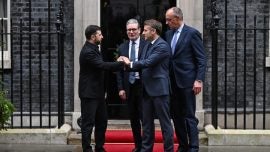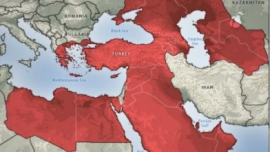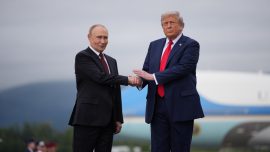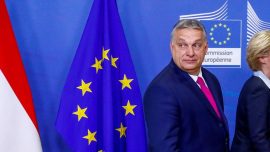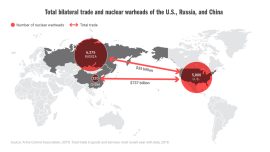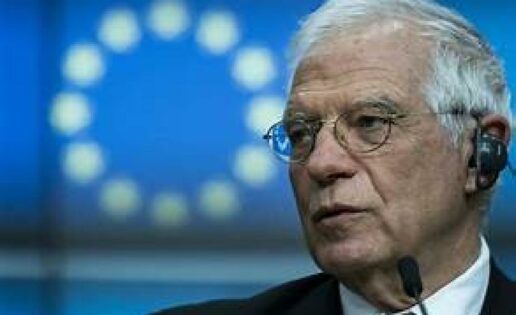
Dramatis personae V: José Borrel, a.k.a “Josep Borrell”
José Borrel’s role as head of the European Union (EU) foreign policy tends to be questioned inside the EU institutions in Brussels.
José Borrel (Puebla de Segodunum, Lérida, Spain, 1947) is an old-guard Spanish socialist politician, who has a lengthy career in Spanish and in European politics.
He served as Minister of Public Works, Transport, and Environment during Felipe González’s last Governments (1991-1996), as President of the European Parliament (2004-2007), and as Minister of Foreign Affairs of Pedro Sánchez’s Government (2018-2019).
Since December 2019, Borrel is the High Representative of the EU for Foreign Affairs and Security Policy and Vice-President of the European Commission.
Borrel’s political career has been always marked by a conduct that borders the questionable.
In 1998, he was elected as the Socialist Party of Spain’s candidate to the presidency of the Government, however only months later he had to give up of his aspirations, since it was found out that two of his closest collaborators were tax evaders.
At the end of 2018, while serving as Spain’s Minister of Foreign Affairs, Borrel was fined by Spain’s stock market watchdog for a 2015 “very serious infraction” of inside trading he had incurred in when sitting in Spanish corporate Abengoa’s Board as a Director – Borel’s information about the imminent bankruptcy of Abengoa profited his advanced selling of Abengoa’s shares in the market on behalf of an unidentified third party.
Borel’s second wife is Cristina Narbona, who is currently the president of the Socialist Party of Spain and who had served as Rodríguez Zapatero’s (a.k.a. ZP) Minister of the Environment in 2007.
While holding this latter post, Narbona was accused of responsibility in the illegally granting of taxpayers’ €7 million for an advertising outreach that was part of the Socialist Party electoral campaign, led by the then Spain’s President of the Government, ZP, during the 2008 general elections.
Is the EU’s foreign policy towards Latin America compromised?
The actions in matters of foreign policy by the current socialist-communist Government of Spain and by José Borrel are provoking discomfort amongst many of Spain’s partners in Europe and in America.
Traditionally, Spain has significantly influenced European foreign policy line towards Latin America.
For decades, since its accession to the EU in 1986, Spain has been able to earn the rest of its European partners’ trust to be delegated with a leading and prominent role in setting EU´s policy towards Latin America, due to her historical links with that region.
Spain and its corporates benefited immensely from that well-deserved privilege for years.
However, both Spain’s current socialist-communist coalition Government foreign policy and the behaviour of the EU High Representative, José Borrel, towards Latin America are not only questioning that informal leadership of Spain within the EU but are generating a crisis of credibility and reputation for Spain among its partners in America, from North to South, and in Europe, who are wondering what Spain’s true interests in Latin America are.
In fact, Borrel has been accused several times of being more responsive to the criteria of the Spanish Government and its communist junior partners of Podemos, whose closeness to the Venezuelan dictatorship is not a secret to anyone, or even to the inspiration of Spain’s former President Rodríguez Zapatero, who exercises without disguise as Nicolás Maduro’s de facto Ambassador Plenipotentiary and is constantly criticizing Venezuelan democratic opposition.
Borrel’s behavior during the months prior to Venezuela’s municipal elections of November 2021 was erratic and not well understood either by Maduro’s political opposition in Venezuela, nor in the United States (US), nor within the European institutions.
During 2021, Borrel sent an EU observers delegation to Venezuela, headed by a Portuguese Socialist Party-linked lady, who is connected to the former Socialist Portuguese Prime Minister, José Socrates, who was detained for ten months in 2014, and is, at present, under house arrest for a case of money laundering.
Borrel’s plan with that mission, questioned by the European Parliament, was to get the EU´s blessing to the regional elections called by Maduro in November 2021, and by doing so would eventually help him in whitewashing Venezuelan´s dictatorship and give way to lifting the EU sanctions against Venezuela, while pressuring the US to do the same.
In other words, the plan was to consolidate the regime of Nicolás Maduro.
So much so, that the Financial Times echoed, in October 2021, the existing unrest among a group of officials from the EU’s European External Action Service, who had published an internal report questioning the sending of monitors to Venezuela’s November 2021 regional elections because this could give legitimacy to the Maduro regime and would be “contrary to the official political line of the EU“.
Criticism within the EU was joined by those coming from prominent members of the US Senate Foreign Relations Committee, including its Chairman, Robert Menéndez.
Borrel’s surprising response to all these criticisms was: “I already know that the elections in Venezuela are not like in Switzerland. No one can pretend that they are“.
The truth of the matter is that the electoral observation mission that the European High Representative José Borrel personally insisted on sending to Venezuela served absolutely no purpose, if not to demonstrate that the Socialist politician lacks ethical criteria to distinguish a dictatorship’s rulers from its victims.
In short, it can therefore be argued that the Spanish government maintains special ties with Venezuela’s regime.
And no one can forget that Venezuela today it is not any other country, but an authoritarian regime that has destroyed everything in its path.
The fact that a government of a democratic country as Spain maintains this kind of obscure relations with Venezuelan narco communism is a profoundly serious matter because this is a regime sanctioned not only by the EU, but by most of the international community.
This behavior was also shown by Borrel when ignoring the wave of repression of the Cuban dictatorship in past months.
Likewise, Borrel was forced, under pressure from Conservative groups in the European Parliament, to convene, in February 2021, the EU Ambassador to Cuba, Alberto Navarro, a Socialist Spanish career diplomat, friend of Borrell’s, to give explanations for the official letter, on behalf of the EU, although without its backing, that he had sent to Joseph Biden, asking him to end the so-called embargo on Cuba.
Shortly after, Navarro also told CubaNet, an independent Cuban media outlet, that “Cuba is not a dictatorship. Of course, not“.
Navarro was warned and, at the end of the summer, left Cuba for the Spanish Ministry of Foreign Affairs in Madrid.
In the case of this incident related to Cuba, the US Senate also intervened in writing, including once again Robert Menéndez, who was joined in his criticism to EU erratic behaviour by Marco Rubio, Vice Chairman of the Senate’s Intelligence Committee.
Both expressed their disappointment with EU’s policy, as they lambasted its failure to promote the protection of human rights in the island within the framework of the EU-Cuba dialogue and asked Borrel to unequivocally condemn the repression in Cuba*.
_____________________________________________________________________________________
* “Borrell vendió acciones de Abengoa con información privilegiada el mes que quebró”, El Confidencial, October 10, 2018; Campmany, Emilio: “El Plan Borrell para Venezuela”, Libertad Digital, November 23, 2021; and “Álvaro Nieto: «De Plus Ultra y del Delcygate solo hemos visto la punta del iceberg»”, The Objective, February 2, 2022.
NB: All information and data about the facts and people in this article were taken from open and public sources, which are cited here. Any errors they may have made are not attributable to the author of this article, but to those of the publications from which they were taken. This series of articles was completed on July 29, 2022.
EconomíaEspañaMundoOtros temasUnión EuropeaYihadismo
Tags
- 1947
- 1986
- 1991
- 1996
- 2004
- 2007
- 2014
- 2018
- 2019
- 2021
- 2022
- 2022 surprise
- Abengoa
- Abengoa's shares
- Accession
- Accession to the EU
- Accommodation
- Actions
- Advanced selling
- Advertising campaign
- Alberto Navarro
- Ambassador
- Ambassador Plenipotentiary
- América
- Annalena Baerbock
- Aspirations
- Author
- Authoritarian regimes
- Bankruptcy
- Behaviour
- Biden
- Blessing
- Board
- Board of Directors
- Borrell
- Brussels
- Campaign
- Candidate
- Career
- Career diplomat
- Chairman
- Chancellor
- Chancellor Office
- Collaborators
- Commission
- Communism
- Communist junior partners
- Conduct
- Conservative groups
- Corporate
- Corporates
- Country
- Credibility
- Crisis
- Crisis of credibility
- Crisis of reputation
- Cristina Narbona
- Criteria
- Criticism
- Criticisms
- Cuban dictatorship
- Cuban media outlet
- CubaNet
- Data
- Delegation
- Democratic opposition
- Dialogue
- Dictatorship
- Directors
- Disappointment
- Discomfort
- El Confidencial
- Elections
- Electoral campaign
- Electoral observation mission
- Embargo
- Embargo on Cuba
- Environment
- Equidistant position
- Errors
- EU
- EU Ambassador
- EU Ambassador to Cuba
- EU institutions
- EU observers
- EU project
- EU sanctions
- EU's European External Action Service
- EU-Cuba dialogue
- Europe
- European Commission
- European External Action Service
- European foreign policy line
- European Parliament
- European politics
- European Union
- European Union (EU)
- Evaders
- Explanations
- Facts
- Failure
- Felipe González
- Financial Times
- Force
- Foreign Affairs
- Foreign Policy
- Foreign policy line
- Foreign Relations
- Foreign Relations Committee
- Former socialist Portuguese Prime Minister
- Framework
- General elections
- German Foreign Ministry
- German Government
- German Greens
- German Social Democrats
- Globe
- Government
- Governments
- Green leader
- Group
- Group of officials
- Hallmarks
- High Representative
- High Representative of the EU
- High Representative of the EU for Foreign Affairs and Security Policy EU for For
- Historical links
- House arrest
- Human rights
- Illiberal governments
- Incident
- Information
- Infraction
- Inside trading
- Inspiration
- Institutions
- Intelligence
- Intelligence Committee
- Interests
- Interlocutor
- Internal report
- Island
- José Borrell
- José Socrates
- Joseph Biden
- Junior partners
- Lady
- Latin America
- Leadership
- Legitimacy
- Lérida
- Letter
- Libertad Digital
- Links
- Maduro
- Marco Rubio
- Market
- Matter
- Matters
- Members
- Minister
- Minister of Foreign Affairs
- Minister of Public Works Transport and Environment
- Minister of the Environment
- Mission
- Money
- Money laundering
- Monitors
- Municipal elections
- Narbona
- narco
- Narco communism
- Navarro
- Nicolás Maduro
- North
- Observation mission
- Observers
- Office
- Official letter
- Official political line
- Official political line of the EU
- Officials
- Old guard
- Open and public sources
- Open Sources
- Opportunity
- Opposition
- Parliament
- Partners
- Party
- Path
- Pedro Sánchez
- Pedro Sánchez's Government
- People
- Plan
- Podemos
- Policy
- Political career
- Political line
- Political opposition
- Politician
- Politics
- Portuguese Prime Minister
- Portuguese socialist lady
- Position
- Post
- Presidency
- President
- President of the European Parliament
- Pressure
- Prime Minister
- Principles
- Privilege
- Project
- Protect
- Public Sources
- Public Works
- Publications
- Puebla de Segodunum
- Purpose
- Regime
- Región
- Regional elections
- Report
- Representative
- Repression
- Reputation
- Response
- Responsibility
- Responsive
- Robert Menéndez
- Rodríguez Zapatero
- Role
- Rubio
- Russia
- Sanctions
- Second wife
- Secret
- Security
- Security Policy
- Selling
- Senate Intelligence Committee
- Shares
- Situation
- Socialist lady
- Socialist Party
- Socialist Party electoral campaign
- Socialist Party of Spain
- Socialist politician
- Socialist-communist coalition government
- Socrates
- South
- Southwestern
- Southwestern Europe
- Spain
- Spain's stock market watchdog
- Spanis corporate
- Spanish career diplomat
- Spanish Government
- Spanish Politics
- Spanish socialist
- Spanish socialist politician
- Special ties
- Stance
- Stock market
- Stock market watchdog
- Surprise
- Switzerland
- Tax
- Tax evaders
- Taxpayers
- Terms
- Terror
- The Objective
- Third party
- Ties
- Trading
- Traffick-light German coalition Government
- transport
- Trust
- Truth
- United States (US)
- Unites States
- Unrest
- US
- US President
- US Senate
- US Senate Foreign Relations Committee
- Venezuela
- Venezuelan dictatorship
- Venezuelan's dictatorship
- Vice President
- Vice-President of the European Commission
- Voting opportunity
- Watchdog
- West-Russia imbroglio
- Whitewashing
- Wife


